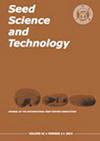Invited Review: Seed germination and salinity tolerance of habitat-indifferent halophytes as associated with geographical distribution
IF 3
4区 农林科学
Q2 AGRONOMY
引用次数: 3
Abstract
Germination response to environmental factors often depends on the seed source. Habitat-indifferent halophytes that can grow well under both saline (SH) and non-saline habitats (NSH) offer a good opportunity to understand salinity tolerance during the germination stage under varying environmental factors, such as temperature and light. This study compared seed germination responses among different populations of two common habitat-indifferent halophytes (Salsola drummondii and Suaeda vermiculata) from subtropical hyperarid deserts of the United Arab Emirates (UAE) and semiarid warm sub-tropical areas in Pakistan. This study highlights many similarities and differences in the seed germination and recovery responses of habitat-indifferent halophytes occurring in two contrasting climatic regions. The germination window of UAE seeds was wider, i.e., they germinated at higher rates under all temperatures in both light and darkness. This indicates that seeds of UAE populations can germinate at any time of the year, if conditions are optimal, and faciltate a faster seedling establishment under fluctuating harsh environmental conditions compared to populations from semiarid warm sub-tropical areas in Pakistan. The eco-physiological significance of the responses is also discussed.特邀综述:不同生境盐生植物种子萌发和耐盐性与地理分布的关系
发芽对环境因素的响应往往取决于种子来源。生境无关盐生植物在盐碱生境和非盐碱生境下都能很好地生长,为了解萌发期不同环境因素(如温度和光照)下的耐盐性提供了良好的机会。本研究比较了两种不同生境盐生植物(Salsola drummondii和Suaeda vermiculata)在阿拉伯联合酋长国(UAE)亚热带极度干旱沙漠和巴基斯坦半干旱温暖亚热带地区不同种群间的种子萌发响应。本研究强调了不同生境盐生植物在两个不同气候区域的种子萌发和恢复反应的相似性和差异性。阿联酋种子的萌发窗口更宽,即在光照和黑暗的所有温度下,它们的发芽率都更高。这表明,如果条件最佳,阿联酋种群的种子可以在一年中的任何时间发芽,并且与巴基斯坦半干旱温暖亚热带地区的种群相比,阿联酋种群的种子可以在波动的恶劣环境条件下更快地建立幼苗。讨论了这些反应的生态生理意义。
本文章由计算机程序翻译,如有差异,请以英文原文为准。
求助全文
约1分钟内获得全文
求助全文
来源期刊

Seed Science and Technology
农林科学-农艺学
CiteScore
3.00
自引率
28.60%
发文量
36
审稿时长
>36 weeks
期刊介绍:
Seed Science and Technology (SST) is an international journal featuring original papers and articles on seed quality and physiology related to seed production, harvest, processing, sampling, storage, genetic conservation, habitat regeneration, distribution and testing. A journal that meets the needs of researchers, advisers and all those involved in the improvement and technical control of seed quality. Published every April, August and December.
 求助内容:
求助内容: 应助结果提醒方式:
应助结果提醒方式:


